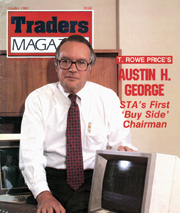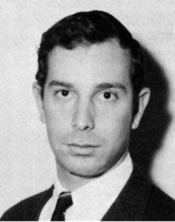Good traders often have a gut feel for what’s about to happen next, an uncanny timing that can be prescient at times. Austin George, the one-time head trader at T. Rowe Price, who’s been retired since 1992, recently fit that description. George penned a letter to this editor on May 5–the day before the Dow Jones Industrial Average plunged nearly 1,000 points before recovering.

The rapid drop in the marketplace on May 6 is still under investigation, but many believe that an individual trading a high volume of e-mini contracts started the spiral. The movement in the underlying stocks was further exacerbated when the exchanges showed a lack of harmonization of their rules during a time of stress. Consequently, stocks continued to plummet.
The gist of the letter from the man, who received his first order from a portfolio manager on the back of an envelope in 1962, is how dramatically equity trading has changed and how difficult it is for someone from his era to follow or even associate with it. "I seldom see any names I know and most of the firms have ceased to exist or merged with others," George wrote in a clear penmanship. "And the trading lingo and techniques of today might as well be a totally foreign language."
The letter prompted this editor to call George, a gracious man of 77 years and also a loyal reader of this publication. "Sheer coincidence," is how George described the timing of his letter and the unraveling of the markets. George said he was unsure what long-term effect the plunge would have on investor confidence, but he said that when trades occur "much faster than a human’s ability to react to them, you know you’re going to have problems like this crop up." Still, he said investors will always buy and sell stock based on their fundamental value.
In retirement, George hasn’t distanced himself completely from the market and trading. He still might find himself checking the market at noon to see what’s going on. To this day, however, George has vivid dreams about trading. And he’s not always on the winning side. Trading is that ingrained in his psyche, he said, mainly because he has such fond memories of the business.
"It was a different world," said George, who was chairman of the Security Traders Association in 1989 and one of the first buyside participants of a group that was almost entirely comprised of OTC traders. "I’m not saying a better world, but for someone who liked meeting interesting people, it was almost like heaven on earth."
George said that given his personality and orientation toward people, he came into trading at the perfect time. He said he wouldn’t have enjoyed working in today’s market because it is too technical for him. That’s why he left his first job as an engineer at DuPont, after graduating from Princeton University in 1955. He took a job at T. Rowe Price to run operations four years later.
The trading desk was initially just him. Portfolio managers would return from their Friday lunch meeting and hand him a sheet of paper with a list of stocks to buy or sell and how much. His first block trade was done with Salim "Cy" Lewis, the giant of a trader at Bear Stearns who ran trading, he recalls. And since T. Rowe was a no-load fund, it didn’t need to remunerate brokers for selling its fund, so George was free to trade with many of the third-market firms that traded on a net basis. This helped lower commissions before Mayday-which ended fixed commission rates in 1975 and made brokerage commissions competitive. Firms like Weeden & Co. and Blyth & Co. were frequent calls of his, as they made tight markets without a commission, he said.
Goldman Sachs, First Boston and Salomon Brothers also threw their financial muscle around then, looking to attract the big block trades, he said. "Some of them would commit capital at the drop of a hat, while others would take a bit longer to think about it," he said. A capital trade was significant then, he added, because that was in the day when Wall Street consisted of private partnerships, so the risk was on the shoulders of the firm’s employees, not shareholders like today.
Within the first five minutes of the phone call, George reached for a block trading directory from 1968 that was on his shelf. He recounted the names of firms long out of business and the names of traders who haven’t traded in decades, including Michael Bloomberg, who ran equity trading at Salomon Brothers from 1976 until 1981, before venturing out to start his own data and information company. (He also read the names of Bob Mnuchin of Goldman Sachs and Jay Perry of Salomon, two legends in block trading.)

George met Bloomberg when he first took the reins at Solly. His OTC coverage, Howard Levine, introduced them at the STA national convention in Boca Raton, Fla. "He was very shy and feeling his way at first," George said. Their relationship grew during Bloomberg’s tenure. The two would meet for breakfast, George said, when Bloomberg would attend functions at Johns Hopkins University, his alma mater in Baltimore. "We did quite a bit of business with Mike when he was on the desk," he said.
Before electronic trading became prevalent, George said that each brokerage firm had its own personality and area of specialty. It was his job to give an order to the appropriate broker in each situation. For example, one firm might have a great utility trader, while another firm might have a great floor broker that was good at "hiding in the woodwork" or knew how to deal with a difficult specialist. "It was all about knowing people," George said.
George likened himself to a conductor of a symphony orchestra. "Sometimes I needed woodwinds and sometimes I needed brass," he said. George was a traders’ trader in the sense that he never wanted to micro-manage his brokers. "I’d give a guy instructions, but I never wanted to tie his hands," George said. "I was much more willing to give him scope and let him use his prowess. You have to have faith in the people that you are dealing with."
Still, there were no free rides, and brokers knew their performance was being critiqued. "I’d simply tell them, ‘I’ve got a lot of faith in you, but if you don’t fulfill it, you might not see me for a while.’"
George remembers the back-office crunch, when the markets were closed on Wednesdays so firms could keep up with the processing of trades. In fact from today’s perspective, it is almost unbelievable that he actually had to warn firms that he would stop trading with them if their fail rate didn’t improve.
Later would be the bear market of 1973, which he called the most painful time, likening it to a balloon losing air. Stocks declined day after day, and worse, there was no trading volume. For the T. Rowe Price Growth Stock Fund it was a painful time because the world had turned its back on growth stocks and their high price-to-earnings ratio, George said. The Crash of 1987 was just the opposite in its duration, he said. Although many feared their firms wouldn’t survive, he said that worry was short lived and subsided after the markets recovered.
But it was the people that made George’s 30 years in trading memorable, he said, particularly the "characters." He recalled the time an Ivy League-educated portfolio manager was invited to a traders’ dinner. He accepted the invitation. Not used to being around traders after the bell, the stock picker of Brahmin heritage was aghast at some of the shenanigans that went on during dinner.
But it wasn’t just portfolio managers who questioned George’s friendships. Even the traders would ask him how a Princeton graduate could be so comfortable around a group of OTC traders like themselves and fit in.
Looking back, George said, "They were some of some of my best friends; they were just wonderful, extraordinary people." And from a business perspective, he said, they knew their stocks and how to trade.
George ended his letter with an endorsement of the trading profession and an enduring optimism that both an industry and those in it will always strive to do what is best for their customers. And that a trader’s word is his bond, or Dictum Meum Pactum, which is the STA’s credo.
"I was lucky enough to have traded in a great era well populated by many of the finest people I’ve known," George wrote. "And yes, I still believe it–Dictum Meum Pactum."



